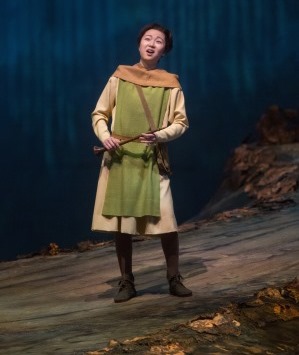Reviews
Met Tannhäuser Returns, but the Time Has Come...
 NEW YORK—James Levine’s appearance at the Metropolitan Opera to conduct Tannhäuser on Oct. 8 was his first of the new season and, perhaps more important, his first since the company announced, less than a week before, that he was pulling out of its new production of Lulu, set to debut next month. Reality, it seems, finally caught up with him.
NEW YORK—James Levine’s appearance at the Metropolitan Opera to conduct Tannhäuser on Oct. 8 was his first of the new season and, perhaps more important, his first since the company announced, less than a week before, that he was pulling out of its new production of Lulu, set to debut next month. Reality, it seems, finally caught up with him.
To those who questioned the heavy, even gluttonous schedule he set for himself since his return to the Met two years ago after a prolonged, health-mandated absence, his defection from Lulu came as little surprise. A statement issued by the company said simply that he wanted to “focus his energies completely” on Tannhäuser, but offered nothing in the way of an apology for the disruption of a schedule that was overloaded in the first place.
His arrival in the pit Thursday drew the usual hearty ovation from the audience, but calls for his resignation as the Met’s music director, in favor of taking a laureate position, are now emanating from the press and understandably so. As his performance demonstrated on Thursday, he remains an asset to the Met, but no one is indispensable.
Not that he didn’t demonstrate a formidable grasp of the Tannhäuser score. He was on the podium when the Schenk production was new in 1977, rightly opting for the Paris version, with its ravishing Tristanesque music in the Venusberg Scene, and has conducted the vast majority of performances here since.
As usual, the Met’s excellent orchestra, assembled by him over the years, played glowingly for him and he established a comfortable rapport with the singers. It was an accomplished reading, with moments that revealed the score’s beauties. And although he conducts from a motorized wheelchair, his upper torso retains ample vigor, which from all appearances allows him to communicate with exactly the gestures he wishes.
But Levine’s Wagner has always been rather leisurely paced for my tastes, and while that has been especially the case with Parsifal, I sensed it here as well. Over the years he justified slowish tempos not so much by emphasizing details along the way as by charging the music with visceral excitement—explosive attacks, strongly punctuated chords, melodic surges, overall sweep. These elements were rather muted on Thursday, with the result that the music sometimes lacked the energy it ought to have. The evening seemed very long, and not just because of the unusually long intermissions, possibly designed to give Levine extra time between acts. (The usual four-hour running time was stretched by at least 30 minutes.)
As for the production, it is bound to be remembered fondly by longtime Met-goers. Otto Schenk was for many years the answer of the Met’s German wing to Franco Zeffirelli. His naturalistic productions of Wagner were, at least at first, enthusiastically welcomed as alternatives to more extreme, conceptual approaches. But, like Zeffirelli’s productions, Schenk’s are being phased out, and it is probably time to bid a fond farewell to his Tannhäuser. Still, Günther Schneider-Siemssen’s Act I set (which returns in Act III) remains a beauty to behold, and the way it almost magically transforms itself from the Venusberg into a valley near the Wartburg is something current designers should try to emulate.
If you watched Norbert Vesak’s choreography without knowing it’s supposed to represent the depraved carnal excesses of Venusberg, you might think you were witnessing a pleasant woodland scene with nymphs and other mythological characters. These days we see so much simulated sex on the opera stage that Vesak’s dance-making was almost a breath of fresh air, and its execution was excellent. The revival director Stephen Pickover, though, does little to breathe new life into the action of the principals.
The men in the cast are especially good. It was a pleasure to hear so punishing a role as Tannhäuser sung with the security and bright, resonant tone that Johan Botha brought to it. His singing was utterly consistent, perhaps to a fault, and never tired. Peter Mattei sang with some choppy phrasing in Act I but went on to give a memorable portrayal of Wolfram that blossomed in the exquisite lyrical expressions of Act III. Günther Groissböck contributed a stalwart, handsomely sung Landgrave.
The production has seen better Venuses than Michelle DeYoung, but the singer delivered the love goddess’s entreaties to Tannhäuser with robust tenacity. Although her acting was of the old school, Eva-Maria Westbroek offered a visually attractive, dramatically involved and opulently sung Elisabeth, but her fluttery sound often resulted in approximations of pitches. The captivating soprano Ying Fang might well be the production’s best Shepherd since Kathleen Battle made her Met debut in the part when the production was new.
Pictured: Ying Fang, perhaps the "best Shepherd since Kathleen Battle made her Met debut in the part."





 FEATURED JOBS
FEATURED JOBS

 RENT A PHOTO
RENT A PHOTO


